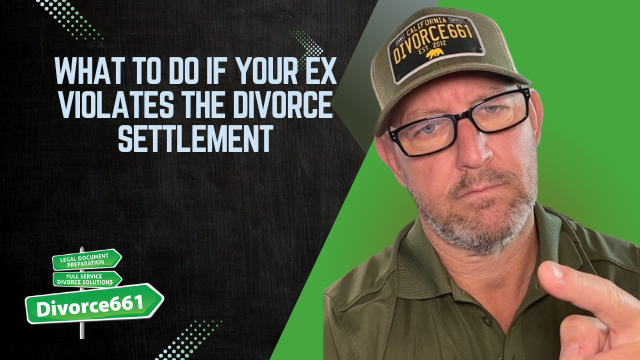What to Do If Your Ex Violates the Divorce Settlement
Dealing with a divorce is already a challenging experience, but when your ex refuses to follow the terms of your divorce settlement, it can feel overwhelming. Whether it’s missed support payments, not adhering to custody arrangements, or failing to transfer property, knowing your rights and the steps you can take is vital. In this blog, we’ll walk through what to do if your ex violates the divorce settlement and how to enforce your rights.
Recognizing a Violation of the Divorce Settlement
First things first, it’s essential to identify what constitutes a violation of your divorce settlement. Common violations may include:
- Failure to pay spousal or child support.
- Not turning over assets as agreed upon.
- Ignoring custody schedules or visitation rights.
If you notice any of these issues, you have the right to enforce the order through the court system. But how do you go about it?
Filing a Request for Order (FL-300)
One of the first steps you can take is to file a Request for Order (FL-300) to ask the court to enforce the terms of your judgment. Here’s how to do it:
- Gather Evidence: You’ll need to collect evidence of the violation. This could include missed payments, communication records, or proof that property wasn’t transferred as stipulated in the agreement.
- File the Request: Complete the FL-300 form and file it with the court. Make sure to include all the evidence you gathered to support your claim.
- Attend the Hearing: After filing, a court date will be set. Be prepared to present your evidence and explain how your ex has violated the settlement.
It’s crucial to understand that courts take these violations seriously, especially when they involve child support or custody arrangements. Depending on the situation, the court can order compliance, make up time for missed obligations, or impose sanctions.
Contempt of Court: When Is It Applicable?
In more serious cases, filing a contempt of court action may be appropriate. This can lead to significant penalties for your ex, including fines, wage garnishment, or even jail time. Here’s when you might consider this route:
- If your ex has willfully disregarded the court’s orders.
- When financial penalties are needed to enforce compliance.
- If repeated violations show a pattern of non-compliance.
Contempt actions are a powerful tool, but they should be used judiciously. If the court finds your ex in contempt, they may face serious repercussions that could further complicate your relationship.
Real-Life Example: Enforcement in Action
Let’s look at a real client story to illustrate how enforcement can work. One of our clients faced a situation where their ex refused to hand over a vehicle awarded in the divorce settlement. After filing a motion with the court, not only did our client receive the vehicle, but they were also awarded attorney’s fees for the enforcement process. This case exemplifies the potential for a favorable outcome when you take the necessary legal steps.
Steps to Take When Your Ex Violates the Agreement
If you find yourself in a situation where your ex is not following the settlement, here are actionable steps to consider:
- Document Everything: Keep detailed records of any violations. This includes missed payments, messages, or any other relevant communications that demonstrate non-compliance.
- Communicate: If possible, try to address the issue directly with your ex. Sometimes a simple conversation can resolve misunderstandings without escalating to legal action.
- Consult an Attorney: If violations continue, seek advice from a family law attorney. They can help you understand your options and guide you through the process of filing a motion or request.
- File a Motion: If informal communication fails, proceed with filing the FL-300 or a motion for contempt, depending on the severity of the violation.
- Prepare for Court: Gather all evidence and be ready to present your case clearly and effectively during the court hearing.
Potential Consequences for Violating Divorce Settlements
Understanding the potential consequences of violating a divorce settlement is critical. Here’s what might happen:
- The court may order compliance with the original terms.
- Makeup time could be awarded for missed visitation or support payments.
- Your ex might face fines or be held in contempt, leading to legal penalties.
It’s essential to remember that the court’s primary goal is to ensure that the terms of the divorce settlement are followed to protect the rights of both parties involved.
Why Choose Divorce661?
At Divorce661, we specialize in divorce enforcement cases and handle them quickly and professionally. Here’s why you should consider us:
- Flat-fee services—no surprise legal costs.
- 100% remote support across California.
- We help you protect your judgment and peace of mind.
If your ex is not following the court order, don’t hesitate to reach out for help. Visit Divorce661.com for a free consultation, and let’s hold them accountable.
Final Thoughts
Dealing with a non-compliant ex can be exhausting and frustrating. However, knowing your rights and the steps to take can empower you to enforce your divorce settlement effectively. Whether it’s through filing a Request for Order or pursuing a contempt action, you don’t have to navigate this process alone. Take action, protect your rights, and ensure compliance with the terms that were put in place to safeguard your future.
What part of your divorce judgment is your ex ignoring? Let’s talk about it in the comments below!

